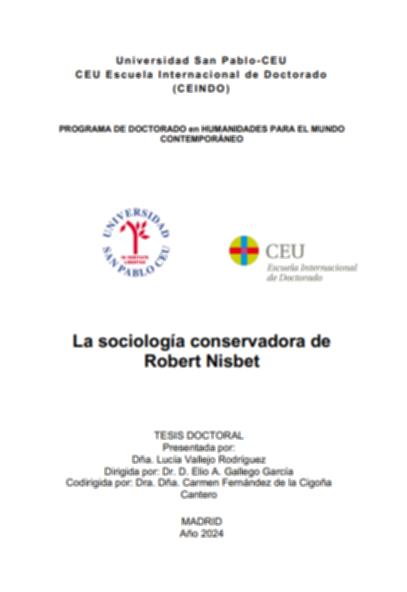Please use this identifier to cite or link to this item:
http://hdl.handle.net/10637/16237La sociología conservadora de Robert Nisbet

See/Open:
Sociologia_Vallejo_USPCEU_Tesis_2024.png
48,9 kB
image/png
See/Open:
Sociologia_Vallejo_USPCEU_Tesis_2024.pdf
Until 2026-09-13
3,65 MB
Adobe PDF
Request a copy
| Title: | La sociología conservadora de Robert Nisbet |
| Authors : | Vallejo Rodríguez, Lucía |
| Keywords: | Sociología; Conservatismo; Vínculo social; Estado; Sociology; Conservatism; Social bond; Community |
| Citation: | Vallejo Rodríguez, Jucía (2024). La sociología conservadora de Robert Nisbet. CEINDO - CEU Escuela Internacional de Doctorado, Universidad San Pablo-CEU |
| Abstract: | Este trabajo de investigación se adentra en las ideas del influyente sociólogo y pensador conservador del siglo XX, Robert Alexander Nisbet. Se busca comprender cómo Nisbet a través de su perspectiva y análisis sociológico, articula una crítica incisiva a la modernidad. Nisbet alcanzó reconocimiento gracias a su primera obra The Quest for Community, en la que afirmaba que la preocupación contemporánea por la comunidad era el resultado del desplazamiento de las instituciones intermedias entre el individuo y el Estado. El Estado, a lo largo de su desarrollo histórico, ha penetrado y alterado el funcionamiento intrínseco de los grupos sociales intermedios tales como: la familia, la parroquia, la universidad y las distintas asociaciones voluntarias, llegando a usurpar sus roles y jerarquías, hasta suplantar su misma existencia. Este estudio subraya la importancia de las instituciones tradicionales y sus elementos, las cuales confieren a los individuos un sentido, un propósito funcional, además de seguridad material y moral. La desintegración de estas instituciones deja al individuo moral y emocionalmente desamparado, incrementando su vulnerabilidad a caer en dinámicas sociales autodestructivas. Así, ante el escenario actual de creciente alienación y fragmentación social, recuperar el pensamiento de Nisbet se convierte en una necesidad imperante y oportuna. This research paper delves into the ideas of the influential twentieth century sociologist and conservative thinker, Robert Alexander Nisbet. It seeks to understand how Nisbet, through his sociological perspective and analysis, articulates an incisive critique of modernity. Nisbet achieved recognition through his early work The Quest for Community, in which he argued that the contemporary concern with community was the result of the displacement of intermediate institutions between the individual and the state. The State, throughout its historical development, has penetrated and altered the intrinsic functioning of intermediate social groups such as the family, the parish, the university and the various voluntary associations, usurping their roles and hierarchies, to the point of supplanting their very existence. This study underscores the importance of traditional institutions and their elements, which provide individuals with meaning, functional purpose, as well as material and moral security. The disintegration of these institutions leaves the individual morally and emotionally helpless, increasing his vulnerability to fall into self-destructive social dynamics. Thus, in the current scenario of growing alienation and social fragmentation, recovering Nisbet's thought becomes an imperative and timely need. |
| Description: | Tesis CEINDO, Universidad San Pablo CEU, Programa de doctorado "Humanidades para el Mundo Contemporáneo". Leída el 13 de septiembre de 2024 |
| Director(s): | Gallego García, Elio Alfonso Fernández de la Cigoña Cantero, Carmen |
| Defense date: | 13-09-2024 |
| URI: | http://hdl.handle.net/10637/16237 |
| Rights : | http://creativecommons.org/licenses/by-nc-nd/4.0/deed.es |
| metadata.dc.date.endEmbargo: | 2026-09-13 |
| Issue Date: | 27-Jan-2024 |
| Center : | Universidad San Pablo-CEU |
| Appears in Collections: | Humanidades para el Mundo Contemporáneo |
Items in DSpace are protected by copyright, with all rights reserved, unless otherwise indicated.

